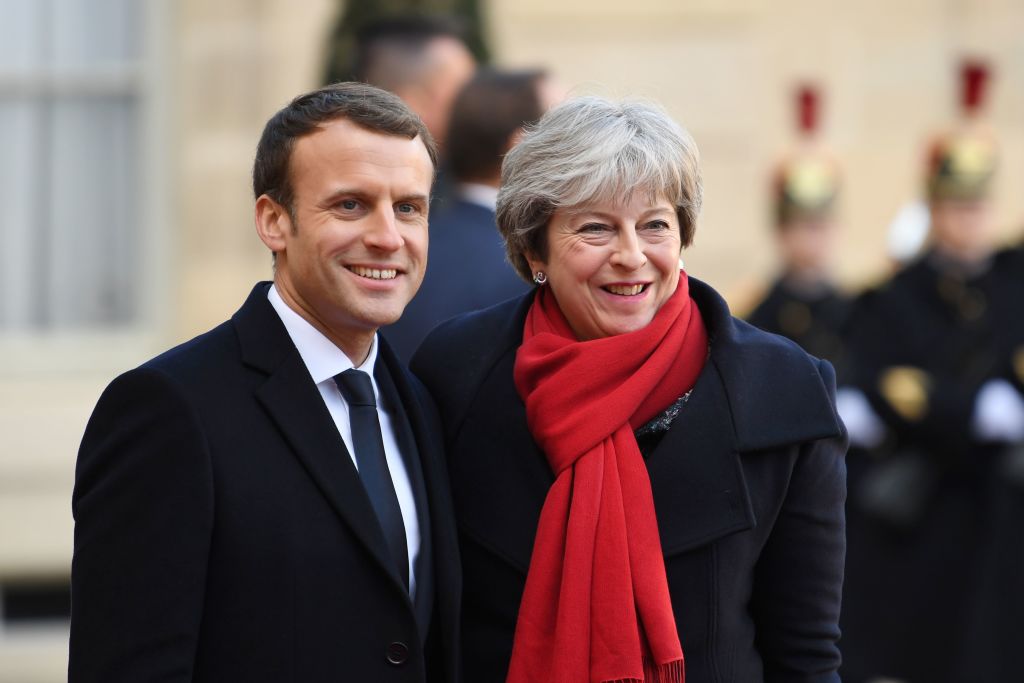Theresa May hosts Emmanuel Macron at Sandhurst tomorrow, an encounter that is unlikely to paint the British Prime Minister in a flattering light. Their styles of leadership are chalk and fromage, one assertive and confident, the other apologetic and diffident.
In particular, May’s growing custom for contrition is eroding her authority. Unless she’s personally responsible for spreading Aussie flu why did May say sorry for the recent NHS crisis? It’s not a Prime Minister’s job to grovel to the public; it’s her ministers. But now she’s set a precedent and so every time something goes wrong her opponents will demand an apology. If she refuses, they’ll say she’s callous.
Macron doesn’t do apologies. The over-confident youngster, still a teenager when May entered Parliament in 1997, believes that in politics attack is the best form of defence. It throws opponents off-guard, exposes their hypocrisy and wins over floating voters. Hence his growing popularity in France, with the most recent poll indicating another rise in his approval rating.
The irony is that Macron doesn’t court popularity. He sticks to his line and stands up to his critics, and respect is the upshot. But May, so desperate to turn the ‘Nasty Party’ into the party of niceness, comes across as indecisive and incapable. Never more so than last July when she asked other parties in the Commons to ‘come forward with your own views and ideas about how we can tackle these challenges as a country’. Not exactly Churchillian.
Macron, on the other hand, is styling himself on Charles de Gaulle, sharing his predecessor’s belief that ‘France cannot be France without greatness’.
In order to make France Great Again, Macron is taking the decisions he believes necessary and he has the confidence – some say arrogance – to ignore his critics. Of course, French presidents have a crucial advantage over British Prime Ministers in that they aren’t exposed to the weekly ordeal of PMQs, and rarely have to dirty their hands in domestic political dogfights. That’s the job of Macron’s Prime Minister, Édouard Philippe, a quietly effective deputy, barely known outside France.
Macron, meanwhile, shows no sign of easing up on the assertiveness. Having upset many in France in the summer with references to ‘losers’ and ‘slackers’ – remarks for which, of course, he never apologised – the president ran into controversy in Burkina Faso in November when he made an off-the-cuff quip about his opposite number, Roch Kaboré, sneaking off to fix the air conditioning during a Q&A session with students. Those present laughed; those on Twitter had one of their customary tantrums, labelling Macron ‘racist’ and ‘colonialist’. He described those comments as ‘ridiculous’, adding that the Social Justice Warriors are ‘the real paternalists because they consider that you’re not allowed to joke when talking to an African leader.’
A week later, Macron stood up to a young man in Algeria as he sought to wring an apology about French colonisation. The president asked the man’s age. Twenty-five. ‘But you’ve never known colonisation!’ exclaimed Macron ‘Why are you getting me involved in that? Your generation should look to the future.’
This month Macron has gone on the offensive against the country’s bleeding hearts, or belles âmes as they’re known across the Channel. What particularly got the president’s goat were the comments of Jean-Marie Gustave Le Clézio, the 2008 Nobel Prize in literature winner, concerning the government’s impending immigration bill. Last year, a record 100,000 people sought asylum in France, an unmanageable figure for Macron who, backed by the majority of the country, has promised to welcome genuine refugees but expel illegal immigrants.
This has infuriated many belles âmes (who ignore the fact that the principal country of origin for asylum seekers in 2017 was Albania) and in a recent interview Le Clézio railed against the ‘monstrous coldness’ of the bill and Macron’s ‘insupportable denial of humanity’.
Macron wasn’t having that. Lamenting the ‘great confusion among intellectuals’ on the question of Europe’s migrant crisis, the president told Le Clézio and his ilk that ‘beautiful words’ are not enough in the face of an ‘unprecedented’ wave of migration into the continent.
Macron’s readiness to speak his mind, as he did on Tuesday in accusing human rights charities of manipulating migrants in Calais, has been a breath of fresh air for the French people, so weary of politicians who do little but procrastinate. Britain meanwhile is lumbered with May, a leader who once talked of being strong and stable but turned out to be weak and wobbly.







Comments